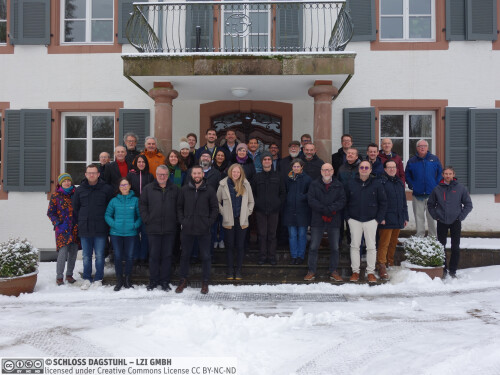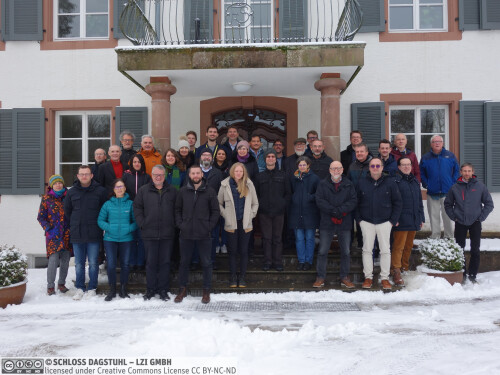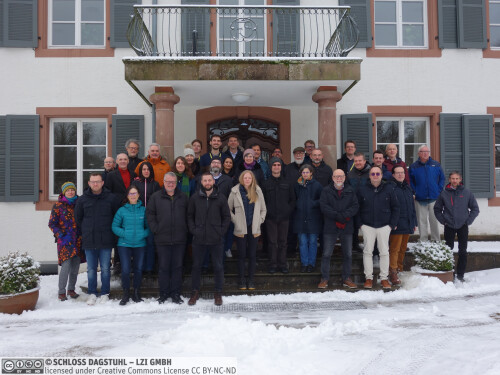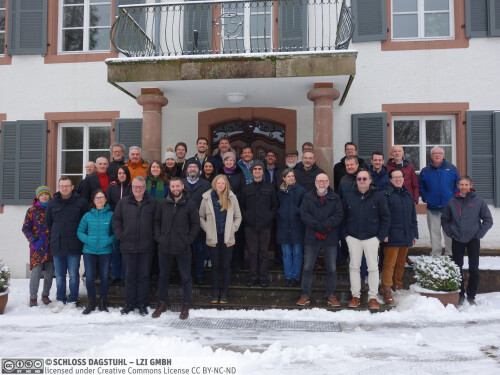Dagstuhl Seminar 24031
Fusing Causality, Reasoning, and Learning for Fault Management and Diagnosis
( Jan 14 – Jan 19, 2024 )
Permalink
Organizers
- Alessandro Cimatti (Bruno Kessler Foundation - Trento, IT)
- Meir Kalech (Ben Gurion University - Modiin, IL)
- Maria Krantz (Helmut-Schmidt-Universität - Hamburg, DE)
- Ingo Pill (Silicon Austria Labs - Graz, AT)
Coordinator
- Alexander Diedrich (Helmut-Schmidt-Universität - Hamburg, DE)
Contact
- Marsha Kleinbauer (for scientific matters)
- Jutka Gasiorowski (for administrative matters)
Impacts
- Root cause analysis using anomaly detection and temporal informed causal graphs : article in ML4CPS – Machine Learning for Cyber-Physical Systems - Rehak, Josephine; Youssef, Shahenda; Beyerer, Jürgen - Hamburg : Universität, 2024. - 10 pp..
- A Lazy Approach to Neural Numerical Planning with Control Parameters : article in ECAI 2024 - Heesch, René; Cimatti, Alessandro; Ehrhardt, Jonas; Diedrich, Alexander; Niggemann, Oliver - Amsterdam : IOS Press, 2024. - 9 pp. - (Frontiers in Artificial Intelligence and Applications ; 392).
- Inferring Sensor Placement Using Critical Pairs and Satisfiability Modulo Theory : article in 35th International Conference on Principles of Diagnosis and Resilient Systems - Niggemann, Oliver; Diedrich, Alexander; Heesch, René; Bozzano, Marco; Ludwig, Björn; Cimatti, Alessandro - Wadern : LZI 2024. ; pp. 9:1-9:19.
- Using Multi-Modal LLMs to Create Models for Fault Diagnosis (Short Paper) : article in 35th International Conference on Principles of Diagnosis and Resilient Systems - Niggemann, Oliver; Dumitrescu, Roman; Merkelbach, Silke; Diedrich, Alexander; Sztyber, Anna; Travé-Massuyès, Louise; Chanthery, Elodie - Wadern : LZI, 2024 : pp. 31:1-31:15.
- Usability of Symbolic Regression for Hybrid System Identification - System Classes and Parameters (Short Paper) : article in 35th International Conference on Principles of Diagnosis and Resilient Systems - Plambeck, Swantje; Schmidt, Maximilian; Subias, Audine; Travé-Massuyès, Louise; Fey, Görschwin - Wadern : LZI, 2024, - pp. 30:1-30:14.
- A Hierarchical Monitoring and Diagnosis System for Autonomous Robots : article in 35th International Conference on Principles of Diagnosis and Resilient Systems - Steinbauer-Wagner, Gerald; Fürbaß, Leo; De Bortoli, Marco; Travé-Massuyès, Louise - Wadern : LZI, 2024.- pp. 1:1-1:9.
- Bridging Hardware and Software Diagnosis : Leveraging Fault Signature Matrix and Spectrum-Based Fault Localization Similarities - Travé-Massuyès, Louise; Wotawa, Franz - Wadern: LZI, 2024. - pp. 5:1-5:15.
Schedule
Our goal for this Dagstuhl Seminar was to find approaches that leverage fault diagnosis to build resilient cyber-physical systems through combinations of symbolic, sub-symbolic, and control theoretic approaches.
Cyber-Physical Systems (CPSs), i.e. systems in which mechanical and electrical parts are controlled by computational algorithms, are not only continuously increasing in size and complexity, but they are also required to operate in evolving and uncertain environments, subject to frequent changes and faults. Detecting and correcting faulty behavior is a highly complex task that needs the help of computational algorithms. The constant advances in sensing technology and computational power, as well as the increase in data recording options, enables and also requires us to rely more and more on methods from Artificial Intelligence (AI) for these tasks, i.e. symbolic AI such as planning and reasoning engines, as well as subsymbolic AI like Machine Learning (ML). Sub-symbolic approaches are primarily used to detect symptoms; symbolic reasoning on the other hand provides diagnosis algorithms to identify root causes (from symptoms or observations) or reason about repairs. Furthermore, control engineering methods guide the system back to normal operation (based on the identified root cause). Since these methods come from different fields, they do not always work together in practice.
The research challenge at hand is to combine symbolic a-priori knowledge and learned data, as well as to develop an integrated concept taking both symbolic and sub-symbolic approaches into account. The leading research questions of this seminar are summarised as follows:
- How can a-priori knowledge be combined with data-centric, machine learning-based algorithms?
- Can we integrate a-priori knowledge such as background knowledge about functions, interfaces and operation modes into ML-algorithms to improve model performance?
- Can we use data to learn parts of the symbolic models?
- And can we develop new algorithms which are a synthesis of both worlds, symbolic and subsymbolic?
All of these research questions must be addressed to practical and resilient cyber-physical systems. To tackle these questions, we invited researchers from symbolic AI, sub-symbolic AI, and control engineering to develop a common notion of fault detection and fault handling tasks that takes also the practical needs from industry-scale problems into account. In this regard the seminar also had a secondary function: Traditional symbolic AI diagnosis is located within the Diagnostics community (DX), while sub-symbolic fault diagnosis was traditionally associated with the fault-detection and isolation (FDI) community within the control theory research field. More recently, also the research field of machine learning has created advances with regard to fault diagnosis. Since this seminar brought together researchers from all of these fields, we hope that the seminar created fertile ground for some cross-domain research initiatives.
Besides the individual contributions to the seminar, we used four breakout sessions to brainstorm ideas and next steps following from this seminar:
1) Breakout Session on Coupling Symbolic and Sub-symbolic Methods for Model Acquisition: Fusing symbolic methods with sub-symbolic methods is both directions is essential for the creation of resilient systems. The research gap that has been identified is that so far most approaches integrate some symbolic knowledge into the majority of sub-symbolic knowledge, or a small part of sub-symbolic knowledge into a large symbolic knowledge base. But both of these directions have drawbacks and do not automatically lead to models that are well-suited for resilient systems that can be used in practice. One takeaway is the idea to organise a competition that incentivises researchers to develop novel modelling formalisms and diagnosis algorithms that mitigate some of the current drawbacks.
2) Breakout Session on Causality -- How to Generate Knowledge from Data: The breakout session detailed the importance of high-level causal models in capturing causal relationships within systems. It was discussed where the difficulties in manually crafting these models lie due to their complexity and the even greater challenge of learning causal models directly from data. Crafting causal models manually, one needs a deep understanding of the dependencies. For learning causal models, a large amount of data even for situations which barely occur is needed.
3) Breakout Session on LLMs for DX - Integrating Large Language Models for Root Cause Diagnosis: The breakout session featured a comprehensive exploration and discussion on the potential and challenges of using Large Language Models in the topics of the "DX" community. The central aspects that were discussed, revolved around (i) the models themselves and their current and potential future capabilities, (ii) the training data for training and refining LLMs for diagnosis tasks, (iii) potential application areas, as well as (iv) current, and (v) future trends and topics that should be monitored or covered by the DX community. As a result, the attendees agreed on writing a position paper, which will capture the current potential and drawbacks of LLMs within DX domains.
4) Breakout Session on Resilient Systems: For resilient systems we saw that the application and scenario play a significant role when aiming to assess what would be "good" and "bad" behavior for some system. The same goes for the question of whether we would assess the performance of a system in a local or a global context. To this end we identified a set of such relevant scenarios ranking from an energy management scenario at a local home, via the operation of an electric grid, via agents/robots in a collaborative disaster or military scenario, to supply chain management. We also discussed and converged to a definition of resilience that would tailor to all the expressed needs.
 Alexander Diedrich, Alessandro Cimatti, and Ingo Pill
Alexander Diedrich, Alessandro Cimatti, and Ingo Pill
The goal of this Dagstuhl Seminar is to provide an interdisciplinary forum to discuss the fundamental principles of fault management and diagnosis, bringing together international researchers from the fields of symbolic reasoning, machine learning, and control engineering. The seminar plans to identify an integrated framework to harmonize problems and algorithms from the different fields, as well as ideas for novel, integrated solutions; and to produce a comprehensive agenda for future research.
Cyber-Physical Systems (CPSs), i.e. systems in which mechanical and electrical parts are controlled by computational algorithms, are not only continuously increasing in size and complexity, but they are also required to operate in evolving and uncertain environments, subject to frequent changes and faults. Detecting and correcting such faulty behavior is a highly complex task that needs the help of computational algorithms. The constant advances in sensing technology and computational power, as well as the increase in data recording options, enables and also requires us to rely more and more on methods from Artificial Intelligence (AI) for these tasks, i.e. symbolic AI such as planning and reasoning engines, as well as subsymbolic AI like Machine Learning (ML). Sub-symbolic approaches are primarily used to detect symptoms; symbolic reasoning on the other hand provides diagnosis algorithms to identify root causes (from symptoms or observations) or reason about repairs. Furthermore, control engineering methods guide the system back to normal operation (based on the identified root cause). Since these methods come from different fields, they do not always work together in practice.
The research challenge at hand is to combine symbolic a-priori knowledge and learned data, as well as to develop an integrated concept taking both symbolic and sub-symbolic approaches into account. How can a-priori knowledge be combined with data-centric, machine learning-based algorithms? Can we integrate a-priori knowledge such as background knowledge about functions, interfaces and operation modes into ML-algorithms to improve model performance? Can we use data to learn parts of the symbolic models? And can we develop new algorithms which are a synthesis of both worlds?
We invite researchers from symbolic AI (diagnosis), sub-symbolic AI (ML) and control engineering to develop a common notion of fault detection and fault handling tasks that takes also the practical needs from industry-scale problems into account. We aim to identify synergies between the research groups’ and practitioners’ expertise and experience, as well as to develop new algorithmic ideas.
 Alessandro Cimatti, Meir Kalech, Maria Krantz, and Ingo Pill
Alessandro Cimatti, Meir Kalech, Maria Krantz, and Ingo Pill
- Kaja Balzereit (Hochschule Bielefeld, DE)
- Gautam Biswas (Vanderbilt University - Nashville, US)
- Marco Bozzano (Bruno Kessler Foundation - Trento, IT)
- Elodie Chanthery (LAAS - Toulouse, FR)
- Alessandro Cimatti (Bruno Kessler Foundation - Trento, IT) [dblp]
- Marco Cristoforetti (Bruno Kessler Foundation - Trento, IT)
- Philippe Dague (University Paris-Saclay - Orsay, FR)
- Johan de Kleer (c-infinity - Mountain View, US)
- Alexander Diedrich (Helmut-Schmidt-Universität - Hamburg, DE)
- Kai Dresia (DLR - Hardthausen, DE)
- Jonas Ehrhardt (Universität der Bundeswehr - Hamburg, DE)
- Alexander Feldman (NextFlex - San Jose, US)
- Kenneth D. Forbus (Northwestern University - Evanston, US)
- Rene Heesch (Helmut-Schmidt-Universität - Hamburg, DE)
- Daniel Jung (Linköping University, SE)
- Lukas Moddemann (Universität der Bundeswehr - Hamburg, DE)
- Angelo Montanari (University of Udine, IT)
- Manfred Mücke (Material Center Leoben, AT)
- Edi Muskardin (Silicon Austria Labs - Graz, AT)
- Oliver Niggemann (Helmut-Schmidt-Universität - Hamburg, DE) [dblp]
- Ingo Pill (Silicon Austria Labs - Graz, AT)
- Gregory Provan (University College Cork, IE)
- Belarmino Pulido (University of Valladolid, ES)
- Josephine Rehak (KIT - Karlsruher Institut für Technologie, DE)
- Pauline Ribot (LAAS - Toulouse, FR)
- Martin Sachenbacher (Universität Lübeck, DE)
- Anika Schumann (IBM Research-Zurich, CH)
- Gerald Steinbauer-Wagner (TU Graz, AT) [dblp]
- Markus Stumptner (University of South Australia - Mawson Lakes, AU) [dblp]
- Anna Sztyber (Warsaw University of Technology, PL)
- Louise Travé-Massuyès (LAAS - Toulouse, FR) [dblp]
- Günther Waxenegger-Wilfing (Universität Würzburg, DE)
- Katinka Wolter (FU Berlin, DE) [dblp]
- Franz Wotawa (TU Graz, AT)
- Marina Zanella (University of Brescia, IT)
- Alois Zoitl (Johannes Kepler Universität Linz, AT)
Classification
- Artificial Intelligence
- Machine Learning
Keywords
- Integrative AI
- Diagnosis
- Fault Detection and Management
- Cyber-Physical Systems
- Model-Based Reasoning





 Creative Commons BY 4.0
Creative Commons BY 4.0
